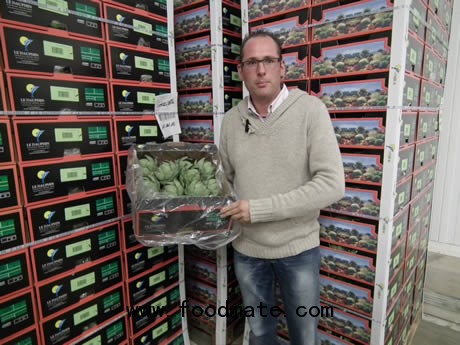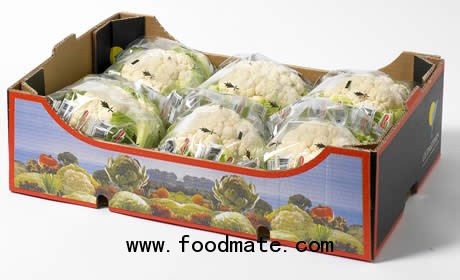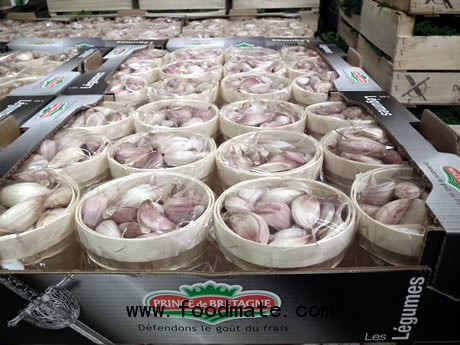
According to Jeroen, cauliflowers are still the most important product of Prince de Bretagne. "Also the traditional wooden crates are still common property here. But we have considerable competition from Spain and Italy in the Netherlands. Unfortunately it is still thought that French cauliflower stinks, but that is really no longer so. In the meantime varieties are still developing. Prince de Bretagne has its own improvement station and varieties have been developed, which can take the rain better and have beautiful leaves. Consumers look more at the leaves than at the cauliflower itself these days. However, we offer the cauliflower as the customer wishes, whether this is shelled, sealed or in rosettes. At our own packing station we can pack according to the wishes of all European supermarkets."

The cauliflower for the Dutch supermarket normally goes in EPS and no longer in the traditional wooden crates. "The Netherlands are really a platform for re-exporters. We export quite a lot to Dutch customers, but often the products do not stay in the Netherlands. Also in a transport technical way French cauliflower is different from the Spanish and Italian product. The advantage of our position is that we the following day could be at the place of destination. Also our cauliflower is firmer of structure and more durable as a result than, for instance, Spanish cauliflower, which grows in ninety days," Jeroen says. "At the moment there are initiatives again - just as before - to transport the vegetables to the Netherlands by rail. Earlier the cauliflower arrived in Barendrecht in this way as well, but this was before my time. It could be a solution in the future to move the loads in a period that transport becomes uneconomical."

The clock is still important in Prince de Bretagne and with that, according to Jeroen, trading is quite different from the Dutch way. "Growers here are not interested in long term arrangements and therefore it is really a matter of trading daily. I think the system has both advantages and disadvantages. We tie our clients, who always buy cauliflower from us, with this and customers in various countries are quite happy with it. Retailers in other countries want annual contracts but growers are not at all interested. The result is that we lose market share in this way."
Clock honest selling system
“On the other hand I will continue to defend the clock as the most honest system in the selling of fruit and vegetables," Jeroen continues. "The Netherlands has seen a rather large period of surplus on the market. Here cauliflower is withdrawn from the market and in this way the market is cleaned up. The one day there is crying and the next laughing, but it is an honest and transparent sales method." Jeroen is quite at home with the French chauvinism. "I am not supposed to pack Spanish cauliflower here, but those are rules one just has to accept."
The exporter commends the cultivation condition is Brittany with day and night temperatures close together. "In my opinion we should be able to do more with the area. Broccoli from this area is excellent, but here growers have done harm to themselves by growing for the industry with lesser quality," Jeroen says. "With a product such as artichokes the area made a difference. This year reasonable tonnage came off the field. The artichoke cultivation is very labour intensive, but costs can be managed. The product is almost organic, as there is hardly any spraying. However, the product is very sensitive to the weather."
Tomatoes
Export of French tomatoes is, according to the exporter, a different story. "On the French market these products always do better than in Belgium or the Netherlands. Especially for the bulk of tomatoes on the vine and round tomatoes you are only filling gaps in the market now and then. However, there is still some export in small wooden cases, but the cultivation is rather expensive." According to Jeroen the demand for organic products is increasing. "Organic products are really a speciality and the mentality of that trade is incomparable to the conventional trade. Therefore we have a separate salesman, who only concentrates on the organic product."
Packing lines following the clients' wishes
In the future Le Dauphin will endeavour to extend its parcel. "Cauliflower is still our number 1, but also the demand for 'smaller' products, such as romanesco and forgotten vegetables, increases considerably. I am convinced that with hard work we can guarantee our future. With our renovated shed and facilities we give surplus value to our products and with that we can make a difference. In this way we are the only ones in Brittany, who are BRC-certified and we have invested in a Nature's Choice certificate for eight own growers. Their products are put up for selling separately each day. When doing what the customer wants lots can be sold," Jeroen says.





